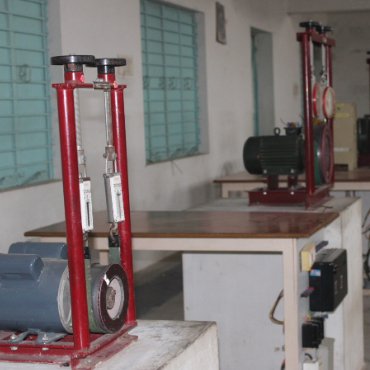LAB FACILITIES
ELECTRICAL MACHINES LAB: 1.Find out Characteristics of DC machines,AC machines and transformer 2.Various speed control methods of Electrical motor. 3.prove all the laws and theorems 4.Understand characteristics of measuring instruments
SIMULATION and CAD LAB: To design and verification of results for various ELectrical and Electronics Circuits using MATLAB Software 2.Design 2D Diagram of symbols widely used in Electrical and Electronics Circuits, starter Circuits,Winding Connections and Line Diagram of Substation using AUTOCAD Software
WIRING, WINDING LAB: Know the connections of Electrical wiring and winding of motors.
POWER ELECTRONICS LAB: Know the control and drives for the Electrical Machine are formed by Power ELecronic Devices.
OPPORTUNITIES
Job prospects:
Electrical Engineers are needed in all manufacturing units. All major companies of public and private sector such as Electricity Boards, Large Scale Industries, Manufacturing Plants, Power Corporations, Hydro-Electricity sector are continuously in need of Electrical Engineers for their projects. Electrical Engineers also find job prospects in Design Industries, Production plants, Natural gas plants, Petroleum as well as in steel and chemical plants. Many premier Educational and Research Institutions regularly recruit electrical engineers as graduate Engineer trainees and Management Trainees to work on research projects. Electrical Engineers can also get a job in Major players in Public Sector such as Indian Railways,Armed forces (Technical Branch) and also in Thermal and Nuclear power Corporation Limited.

Top Recruiters:
PSUs such as BHEL, NTPC,DMRC,NHPC, Power Grid, state electricity boards like APTRANSCO,APGENCO and private companies such as Crompton greaves, Siemens, Hitachi, Jindal steel and power, reliance, I&T, TATA and Samsung engineering.
Trainings
Technical and Soft skill (communication) classes are conducted every week (3 hours), and some trainings like Mathematical skill, substation maintenance (TNEB), Machine oriented training, Testing the electronic components , PLC programming, Field orientation training are given to the every students as a part of Placement training by the Faculty Members of the department.
- Low performance students are identified and special trainings are given to them.
- We proud to say that every year we achieved 100% placement.
STAFF DETAILS
| S.NO | NAME | QUALIFICATION | DESIGNATION |
|---|---|---|---|
| 1 | K. RAMESH | B.E | HEAD OF DEPARTMENT |
| 2 | M. PRAKASH | M.E | LECTURER |
| 3 | S. RENUKA | B.E | LECTURER |